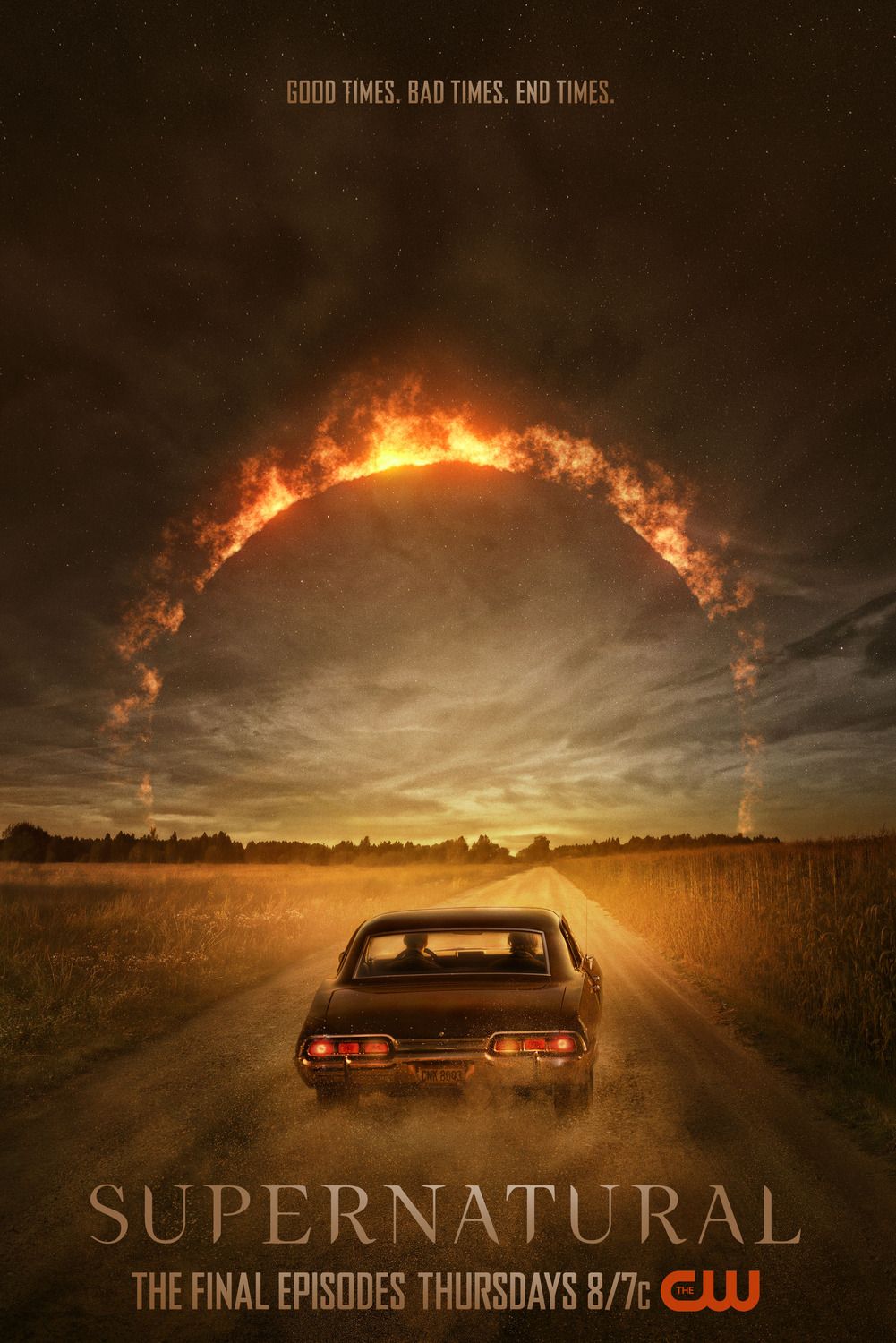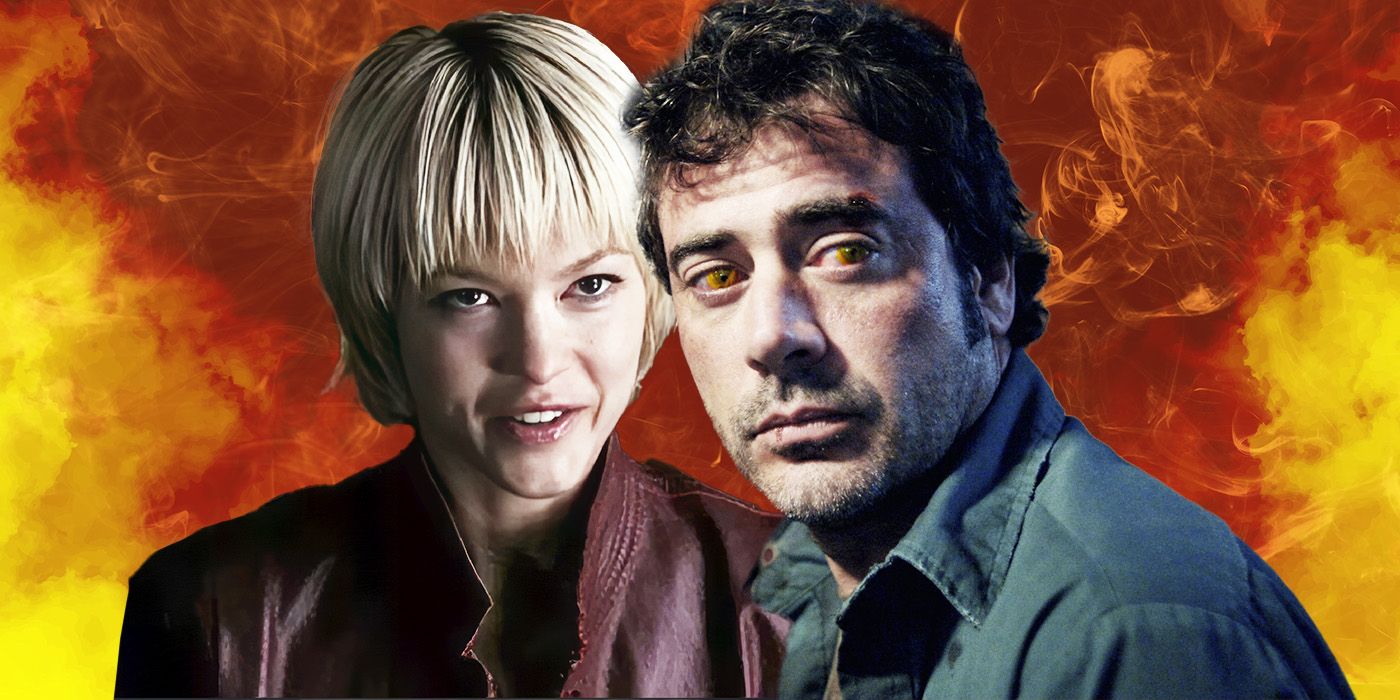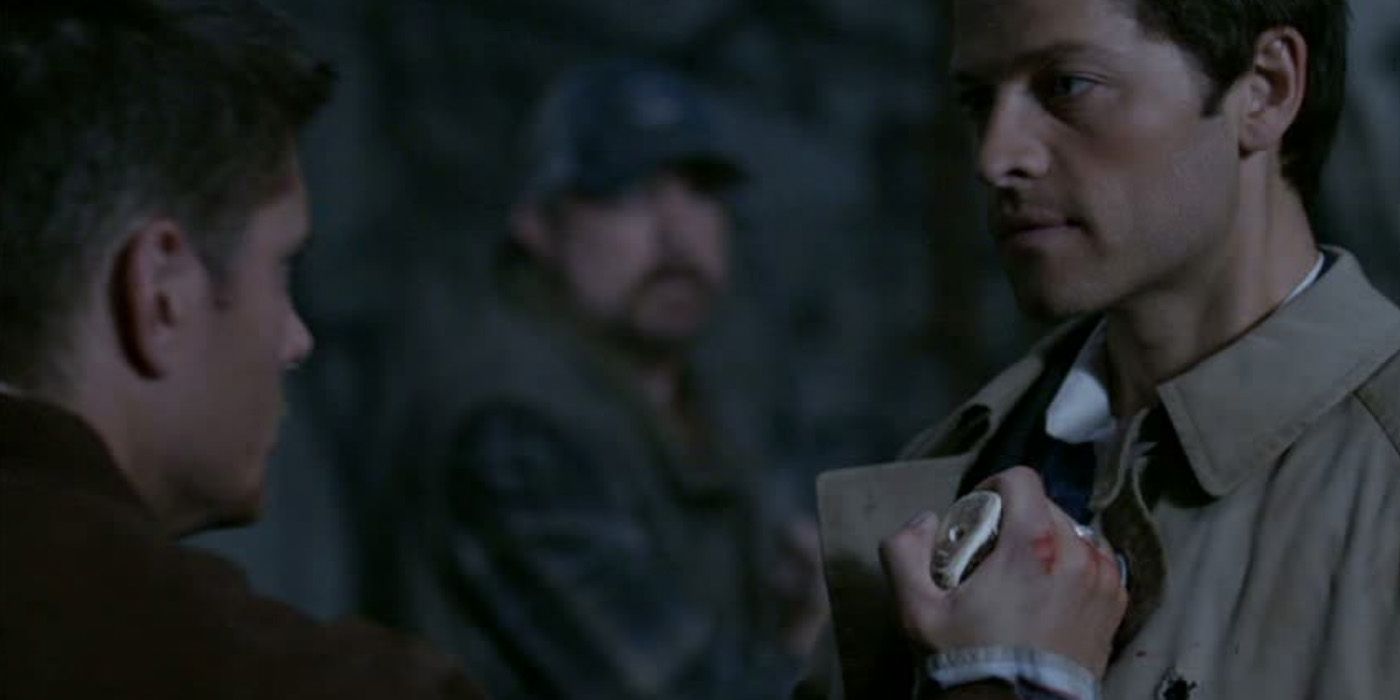The Big Picture
- First three seasons of
Supernatural
lacked angels, changing in Season 4 with Castiel’s introduction. - Series creator Eric Kripke was initially hesitant to include angels, but their addition revitalized the show.
- While angels added depth, later seasons overplayed the angel mythology leading to repetitive storylines.
As we anxiously await any more news about the possible return of Supernatural to television screens everywhere, fans continue to rewatch the horror/fantasy series over and over again. We just can’t get enough of the brother’s Winchester. But until Jared Padalecki and Jensen Ackles fully commit to the program (or at least get the Impala jumpstarted again), one thing that’s of note while revisiting the show’s first few seasons is that the first three seasons didn’t include angels. Well, at least not that Sam and Dean were aware of. It wasn’t until Season 4 that Misha Collins first appeared as Castiel, and the entire show changed as a result. Back in the day, series creator Eric Kripke was originally hesitant to include angels, heaven, and the good side of the spiritual realm at all, but we’re glad he eventually came around. After all, Supernatural likely wouldn’t have lasted as long without the angels on Sam and Dean’s shoulders, and it certainly wouldn’t have been as entertaining.

Supernatural
Two brothers follow their father’s footsteps as hunters, fighting evil supernatural beings of many kinds, including monsters, demons, and gods that roam the earth.
- Release Date
- September 13, 2005
- Creator
- Eric Kripke
- Seasons
- 15
- Studio
- The CW
‘Supernatural’ Poked Fun at Angels Long Before Officially Adding Them to the Canon
It’s funny to look back on the early years of Supernatural now and note the absence of angels, heaven, and other concepts introduced in the back half of Eric Kripke’s significant tenure on the series. Season 1 barely references divine intervention or the concept of angels at all, save for a few episodes such as the aptly named “Faith.”Season 2 took the idea a step further with the Led Zeppelin-titled episode “Houses of the Holy,” in which Sam and Dean investigate the deaths of several locals who were killed by folks claiming to have been instructed by God. As Sam and Dean debate the importance of faith and the existence of angels (Sam is a believer, Dean is not), it’s ultimately revealed that an angel isn’t directing these murders after all. Instead, it’s the spiritual intervention of a dead priest who just happens to be behind the whole thing.
Interestingly, the episode ends with Dean admitting defeat. Dean is shocked that he begins to believe in the concept of divine intervention, and even encourages Sam in his wavering faith. Despite that, the rest of the season and into the third don’t make much use or mention of angels, God, or heaven ever again. “Angels and supernatural forces of good are much more elusive,” Kripke told TV Guide in 2007 regarding how good supernatural forces interact with the world. “But in my opinion — and the opinion of the writers — if God is out there, he isn’t sending angels to fight the battles; he’s working through a very human, sweaty, outgunned and overwhelmed group of hunters.” The series creator was clear back then that angels had no business in the world of Supernatural. Instead, the writers thought of Sam and Dean (and others like them) as the angelic forces fighting the darkness on behalf of a higher power. Of course, this opinion eventually changed.
When the Season 4 premiere “Lazarus Rising” came out, fans were shocked to see a living breathing vesseled angel on the show. Castiel came in with bright, burning wings and a heaven-sent mission to conscript Dean to the side of the angels in the war against the demonic forces of Lucifer (played later by Mark Pellegrino). “You can go back to interviews I gave where I said I’m not putting angels on this show, screw that,” Kripke told Fanbolt in 2009. “The angels kind of evolved because we started to realize that we needed this sort of cosmic battle. We had the empire, but we didn’t really have the rebellion.” While it’s true that Supernatural‘s original three-season plan was adapted into a five-season plan that included angels and the biblical apocalypse, Kripke never strayed from the ending he first envisioned for the series: it only got bigger.
Creator Eric Kripke Thought ‘Supernatural’ Should’ve Included Angels Earlier
By the time angels became a major plot point in Season 4, Supernatural had already exhausted much of its demon plot. The Yellow-Eyed Demon that killed Sam and Dean’s mother was dead (per “All Hell Breaks Loose”), Lillith was on the rise, and Katie Cassidy‘s Ruby wasn’t the hit the network hoped she’d be. Instead, the fourth season worked tirelessly to bring the Book of Revelation to the small screen, pulling directly from Judeo-Christian religion and pushing concepts of predestination, determinism, lawful good vs unlawful evil, and the literal Apocalypse into the Winchester’s messy narrative. By doing so, Kripke and company revolutionized the series and made the final two seasons of Kripke’s tenure as pulse-pounding and high-octane as they could be. There was no doubt that this was a welcome improvement, especially given how non-traditional the angels were portrayed.
Not unlike humans or demons, angels were given well-rounded personalities, questionable motives, and more power than Sam and Dean knew what to do with. We always thought that, given that there are demons, the Devil might be out there. Kripke himself notes that the plan was always to bring about the biblical Apocalypse with Satan leading the charge. As early as the show’s first season, that idea was implanted in the audience’s heads, but flipping the script to include the idea that the Devil is one of the fallen angels (keeping in step with the biblical narrative) rather than a black-eyed piece of work himself only made him all the more dangerous. As did the idea that not all of God’s angels are actually on our hero’s side. Considering the material that the Supernatural writers had to work with following this Season 4 revelation, it’s a wonder they didn’t introduce angels sooner. And, in Kripke’s opinion, they probably should have.
“We always had the demon plan, but the angels came in, and it was one of those things where, if anything, we felt stupid for not thinking of it sooner,” the Supernatural creator revealed to the Chicago Tribune in 2009. “Because how do you have demons without angels?” Kripke continued to explain how they wished they had the budget for TheLord of the Rings-style battle sequences between the angels and demons, but, given their limited resources, had to keep much of that action off the screen. In Kripke’s opinion, the angels were the missing piece of the puzzle that Supernatural needed to thrive, and the series creator even noted that Season 4 (at the time) was his favorite season largely because of that. “We finally stumbled onto the formula by saying it’s about two greasers and a muscle car,” he explained. “But the canvas that they’re on are demons and angels and battles and the apocalypse…” That’s exactly what we love about this show, it was never fully about the spiritual battles being waged, but rather the two brothers at the center of it all.

‘Supernatural’s Best Demon Is in Its Very First Season
‘Supernatural’ has freaked us out since the very beginning.
The Angel Mythology Was Overplayed in Later Years of ‘Supernatural’
Just like with the demon plotlines in the third season, there’s no denying that the angel plot on Supernatural got tired out by the end of Season 5. To be clear, the fifth season expertly utilizes the heavenly forces amid the Apocalypse, and the finale, “Swan Song,” effectively serves as the best conclusion to Supernatural out there (sorry, “Carry On”). But with Season 6, it was obvious that the writers weren’t sure what more they could do with the angels, and by Seasons 10 and 11, it felt like we were forever in a loop of repeating the same angel beats. Eric Kripke himself once noted that the showrunners following his departure (namely Sera Gamble and Robert Singer) didn’t know what more there was to do with angels, which is why Seasons 6 and 7 pivoted so jarringly towards monsters. While that was a good idea, the angel plotline continued to recur in the background, leading to a shaky ninth and tenth season.
By the time the Andrew Dabb and Robert Singer era of Supernatural had gotten underway, it felt like the show was trying too hard to relive its glory days, but without the same TLC that made the Kripke era so exceptional. The truth is that Supernatural thrived in the long term because angels were involved, but that didn’t mean that the angel plotline was always something to write home about. By retroactively making the Trickster (Richard Speight Jr.) and Reapers into angels, Supernatural succeeded in an impossible retcon that only made the show more interesting, but then often failed to make new angel characters past Balthazar (Sebastian Roché) in the sixth season notable. Sure, one could argue that Alexander Calvert‘s Jack (and the Nephilim in general) was a compelling new addition to the mythology, but by and large, the angels failed to capture our interest after the Apocalypse.
Still, in the final years of Kripke’s tenure on the show, it was one of the more fascinating (albeit occasionally sacrilegious) elements of the series’ initial and arguably best run. “Swan Song” alone is a powerful ending to the Winchester saga, largely because of the inclusion of Michael (Jake Abel) and Lucifer. Without them, Sam and Dean’s lives and destinies would’ve been the mechanics of demons rather than angels and demons, which would’ve been much less effective. Thank god that Eric Kripke recanted his initial thoughts on the place of angels in the world of Supernatural. No doubt, without their presence from Season 4 onward, the WB-turned-CW series wouldn’t have lasted more than another few years. Even on Supernatural‘s worst days, we still prefer riding along with Sam and Dean to wandering about without them.
Supernatural is available for streaming on Netflix.


